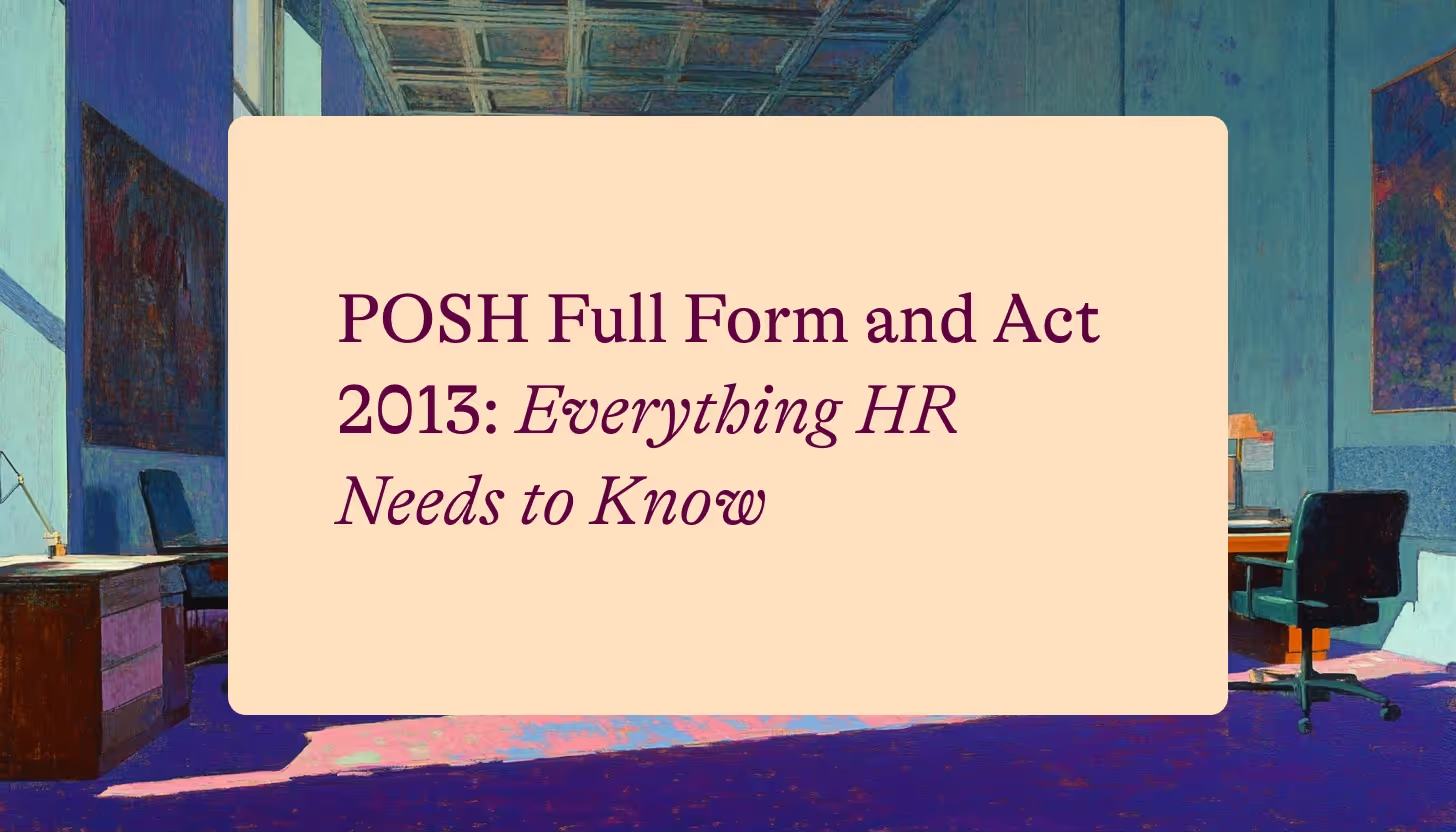The POSH full form is Prevention of Sexual Harassment at Workplace Act, 2013. This landmark legislation was enacted by the Government of India to protect employees from sexual harassment and to mandate organizations to create a safe, inclusive, and respectful work environment.
For human resources professionals, especially those stepping into their role for the first time, understanding the POSH Act is critical. It is not only about legal compliance but also about establishing trust, safeguarding dignity, and shaping workplace culture.
Historical Background of the POSH Act
Before 2013, India lacked a dedicated law addressing sexual harassment in workplaces. In 1997, the Supreme Court of India issued the Vishaka Guidelines in the case of Vishaka & Ors vs State of Rajasthan. These guidelines treated sexual harassment as a violation of fundamental rights under Articles 14, 15, and 21 of the Constitution.
For over a decade, these guidelines acted as the de facto framework. Recognizing the need for codified legislation, Parliament enacted the Sexual Harassment of Women at Workplace (Prevention, Prohibition and Redressal) Act, 2013.
- Full text of the Act (PDF): Government of India – Ministry of Law and Justice
- Rules under the Act: Ministry of Women and Child Development
For a Government information page and other references:
- India.gov.in information page: Act overview and resources
- Central Government complaint portal: SHe-Box (MWCD)
- Government handbook (plain-language explainer): Handbook on POSH (Govt. PDF)
The Act came into effect on December 9, 2013, and applies across India.
Objectives of the POSH Act
The POSH Act has three primary objectives:
- Prevention – to proactively stop instances of sexual harassment through awareness, training, and organizational culture.
- Prohibition – to enforce a zero-tolerance policy on sexual harassment.
- Redressal – to establish formal mechanisms for complaint handling and resolution.
In essence, the Act ensures that employees have access to fair, timely, and confidential grievance mechanisms.
Scope and Applicability
The POSH Act applies to every workplace in India, including:
- Private companies, startups, and multinational corporations.
- Government departments and public sector undertakings.
- NGOs, hospitals, and educational institutions.
- Domestic workplaces employing domestic workers.
Who is covered?
The Act specifically protects women employees, which includes:
- Permanent, temporary, ad-hoc, and contractual workers.
- Interns, trainees, and apprentices.
- Probationers and volunteers.
- Visitors or third parties engaging with the workplace.
While legally gender-specific, many progressive organizations extend their internal POSH policies to men and non-binary employees, ensuring a broader culture of safety and fairness.
What Constitutes Sexual Harassment under POSH?
Section 2(n) of the Act defines sexual harassment broadly. It includes:
- Physical contact and advances.
- Demand or request for sexual favours.
- Making sexually coloured remarks.
- Showing pornography.
- Any unwelcome physical, verbal, or non-verbal conduct of a sexual nature.
Importantly, the Act recognizes both explicit and implicit harassment, covering subtle behaviors that create hostile or intimidating work environments.
Full definition in the POSH Act, 2013.
The Internal Complaints Committee (ICC)
One of the most critical mandates under POSH is the establishment of an Internal Complaints Committee (ICC) in organizations with 10 or more employees.
Composition:
- Presiding Officer: A senior woman employee.
- At least two members committed to social work or women’s welfare.
- One external member (from an NGO, women’s rights body, or with legal expertise).
Duties of the ICC:
- Receive and address complaints of sexual harassment.
- Conduct fair and confidential inquiries.
- Submit recommendations to the employer for action.
- Complete inquiries within 90 days and submit reports to the employer and District Officer.
Responsibilities of Employers and HR Professionals
As custodians of compliance and culture, HR teams should institutionalize the following:
1) Policy and Governance
- Draft and adopt a written POSH policy in plain language, aligned with the Act and Rules.
- Display the policy at conspicuous locations; publish it on the intranet/HRMS.
- Define roles, reporting channels, inquiry timelines, confidentiality norms, and disciplinary consequences.
2) Awareness and Training
- Conduct regular awareness programs for all employees (including probationers, interns, and contract staff).
- Provide specialized training for ICC members on inquiry procedures, evidence assessment, due process, and trauma-informed practices.
- Use induction modules to ensure new joiners understand rights, responsibilities, and reporting channels.
3) Reporting Mechanisms
- Offer multiple reporting options: a dedicated email ID, an online form, or a hotline.
- Encourage early reporting; reiterate anti-retaliation protections.
- For organizations with <10 employees, guide complainants to the Local Complaints Committee (LCC) constituted by the District Officer.
4) Time-bound, Fair Redressal
- Acknowledge complaints promptly; conduct a neutral and confidential inquiry.
- Conclude inquiries within 90 days and implement recommendations within 60 days.
- Maintain secure records and restrict access strictly to those with a legitimate need-to-know.
5) Annual Compliance
- Submit the annual report to the District Officer with the number of cases received, disposed, pending, and the nature of action taken.
- Review and refresh policy and training at least annually.
Failure to comply can lead to fines up to ₹50,000, with escalating penalties including possible cancellation of business licenses for repeated violations.
Reference: MWCD official guidance.
Common Challenges for New HRs—and How to Solve Them
Awareness gaps. Employees may not realize certain behaviours (e.g., “jokes,” persistent compliments, late-night DMs) can constitute harassment.
What helps: Scenario-based sessions, regular reminders, visible posters, and crisp FAQs.
Fear of retaliation. Complainants worry about career consequences or social backlash.
What helps: Reinforce confidentiality and anti-retaliation in policy and in every training; ensure leadership voices this explicitly.
Token compliance. Some organizations treat POSH as paperwork.
What helps: Tie POSH metrics to leadership dashboards (training coverage, time to closure, satisfaction with process); involve senior leaders in awareness sessions.
ICC readiness. Untrained committees may mishandle evidence or timelines.
What helps: Formal ICC training grounded in the Act/Rules; establish SOPs for intake, inquiry, record-keeping, and writing reasoned findings.
Best Practices for Effective POSH Compliance
- Communicate Clearly
Use plain language in policies and training materials. Avoid legal jargon. - Multiple Reporting Channels
Provide employees with diverse options—dedicated email IDs, helplines, or online forms. - Regular Sensitization Workshops
Move beyond one-time sessions. Use case studies, scenarios, and role-plays. - Leadership Buy-in
Involve senior leaders in awareness drives to demonstrate commitment. - Inclusivity Beyond Law
Even though the Act is gender-specific, extend protections to all genders to foster equity. - Document Everything
Maintain records of training, complaints, and resolutions for accountability.
Startups and Small Organizations: Practical Compliance
If your organization has fewer than 10 employees, you are not required to set up an ICC. Instead, complaints are to be escalated to the Local Complaints Committee (LCC) at the district level. Nevertheless, best practice for early-stage teams includes:
- Adopting a written policy now (even if not mandated);
- Providing basic awareness sessions for all staff;
- Listing clear reporting channels, including how to reach the LCC;
- Recording and documenting training and communications.
The Government’s SHe-Box portal is also relevant as a central point of reference. Also read our article on staff welfare to learn how you can help your employees thrive.
Remote and Hybrid Work: Extending POSH to the Digital Workplace
Modern workplaces are often distributed. Courts and practice have taken a broad view of “workplace”, which can include client sites, offsites, and digital spaces where work-related interactions happen (email, collaboration tools, messaging apps, video calls). HR should:
- Clarify that the Code of Conduct and POSH policy apply to official chats, emails, and virtual meetings;
- Include examples of online harassment (unsolicited messages, imagery, repeated unwanted contact, doxxing);
- Train managers to recognize and address digital misconduct quickly and confidentially.
For practical, plain-language guidance, refer to the Government Handbook on POSH.
Best-Practice POSH Implementation Checklist
- POSH policy approved, published, and displayed;
- ICC constituted (if ≥10 employees) with a trained external member;
- Multiple reporting channels operational and communicated;
- Awareness sessions completed for all employees;
- Specialized training completed for ICC;
- Documentation (cases, minutes, actions) securely maintained;
- Annual report format finalized and submission calendarized;
- Vendor/partner clause: extend POSH expectations to third-party staff on premises;
- Remote-work annexure added to cover digital conduct;
- Yearly policy review scheduled.
FAQs on POSH
1) What is the POSH full form?
POSH full form is Prevention of Sexual Harassment at Workplace Act, 2013. It codifies prevention, prohibition, and redressal of workplace sexual harassment.
2) Does POSH apply to startups and SMEs?
Yes. The Act applies to every workplace. If your headcount is <10, complaints are handled by the Local Complaints Committee (LCC) instead of an ICC.
3) Who can file a complaint?
Any woman engaging with the workplace—employee (permanent/contract), intern, trainee, probationer, or visitor—may file a complaint for incidents arising out of or during work.
4) What are the inquiry timelines?
The ICC should complete its inquiry within 90 days, and the employer should act on recommendations within 60 days (see Act and Rules for details).
5) What are the penalties for non-compliance?
Fines up to ₹50,000, and for repeated violations, escalating penalties including potential cancellation of licenses (refer Act and Rules).
6) Where can employees raise complaints online?
The Government runs the SHe-Box portal for registering complaints related to sexual harassment at the workplace: SHe-Box.
Conclusion
The POSH Act, 2013 is more than a statutory requirement—it is a vital instrument for ensuring dignity and equality at work. For HR professionals, particularly those just beginning their careers, ensuring POSH compliance means mastering the ability to safeguard trust and culture in the organization.
A well-implemented POSH framework does more than prevent harassment. It builds confidence, inclusivity, and resilience within the workforce. In today’s dynamic workplaces—whether physical, remote, or hybrid—POSH compliance remains non-negotiable.
.avif)










.avif)














